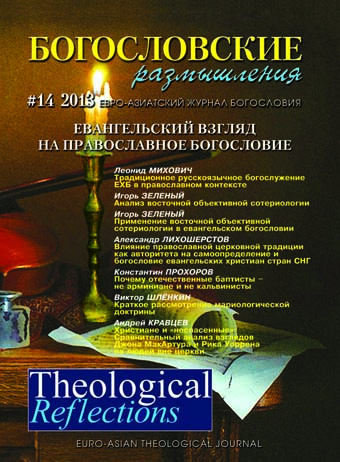An Analysis of Eastern Objective Soteriology
DOI:
https://doi.org/10.29357/issn.2521-179X.2013.14.66Keywords:
Orthodox theology, Soteriology, Eastern OrthodoxyAbstract
This article is an examination of Eastern ontologicalorganic objective soteriology. The study gives a definition and briefly describes the genesis of this movement in soteriology, its formation and development from the second century up until modern times (restoration and revitalization in the nineteenth and twentieth centuries). The article also covers the main principles of this teaching and gives a biblical analysis of its vision, examining the strengths and weaknesses of Eastern soteriology. The main problem of the Eastern vision in the viewpoint of the author is discussed, namely the question of what kind of nature the Lord took upon Himself in the incarnation. It is also stated that the strongest side of this approach is the explanation of the work of Christ as the ontological transfiguration of our nature in Himself. The article presents the originality of this view of salvation and points out that the Eastern vision can provide the basis for an evangelical understanding of atonement and justification, as well as the basis for the evangelical churches’ apologetic of truth as an organic part of the redeemed Body of Christ. This article is useful for theology students studying historical, systematic, and comparative theology as an introduction to the doctrine of Eastern soteriology.References
- Without bibliography
Downloads
How to Cite
Issue
Section
License
Copyright (c) 2020 Igor ZELENY

This work is licensed under a Creative Commons Attribution-NonCommercial 4.0 International License.
All articles published in the Journal are distributed under a Creative Commons Attribution-NonCommercial 4.0 International License
By submitting an article for publication in Theological Reflections: Eastern European Journal of Theology the author grants the editors the right to publish the article and distribute it in electronic and print form.
The author reserves all copyrights and the right to use the materials of the article in whole or in part for educational purposes, to write his own dissertations, to prepare abstracts, conference reports, oral presentations, etc., as well as post electronic copies of articles (including the final electronic version downloaded from the journal’s official website) on non-commercial web-resources without the consent of the editorial board and founders.



